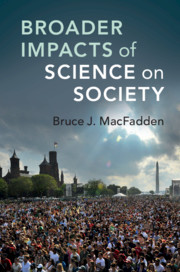Book contents
- Broader Impacts of Science on Society
- Reviews
- Broader Impacts of Science on Society
- Copyright page
- Contents
- Preface
- Abbreviations, Definitions, and Acronyms
- 1 Introduction: Science, STEM, and Society
- 2 NSF and Broader Impacts
- 3 Innovation, Opportunity, and Integration
- 4 Communication and Dissemination
- 5 Promoting Yourself and Optimizing Impact
- 6 Collaboration, Authorship, and Networks
- 7 Strategic versus Curiosity Science
- 8 Know Your Audience
- 9 Diversity, Equity, and Inclusion
- 10 Mentoring and Role Models
- 11 Formal K–12 Education and Partners
- 12 Higher Education
- 13 Informal STEM Learning in Museums and Beyond
- 14 Public Participation and Community (Citizen) Science
- 15 Computers and Cyberimpacts
- 16 Developing a Broader Impacts Plan
- 17 Project Management and Sustainability
- 18 Were You Successful? Evaluation and Metrics
- 19 Wrap-Up, the Future, and Broader Impacts 3.0
- References
- Index
13 - Informal STEM Learning in Museums and Beyond
Published online by Cambridge University Press: 11 October 2019
- Broader Impacts of Science on Society
- Reviews
- Broader Impacts of Science on Society
- Copyright page
- Contents
- Preface
- Abbreviations, Definitions, and Acronyms
- 1 Introduction: Science, STEM, and Society
- 2 NSF and Broader Impacts
- 3 Innovation, Opportunity, and Integration
- 4 Communication and Dissemination
- 5 Promoting Yourself and Optimizing Impact
- 6 Collaboration, Authorship, and Networks
- 7 Strategic versus Curiosity Science
- 8 Know Your Audience
- 9 Diversity, Equity, and Inclusion
- 10 Mentoring and Role Models
- 11 Formal K–12 Education and Partners
- 12 Higher Education
- 13 Informal STEM Learning in Museums and Beyond
- 14 Public Participation and Community (Citizen) Science
- 15 Computers and Cyberimpacts
- 16 Developing a Broader Impacts Plan
- 17 Project Management and Sustainability
- 18 Were You Successful? Evaluation and Metrics
- 19 Wrap-Up, the Future, and Broader Impacts 3.0
- References
- Index
Summary
Informal science education traditionally has been overlooked relative to formal education. There are many reasons why this is the case. Society views formal education, particularly K–12, as a fundamental entitlement, and thus much of the emphasis (but typically not enough resources) has been placed on this kind of learning. Most education colleges in the United States focus on teacher training, counseling, assessment, and educational administration. With few exceptions, such as the Free-Choice Learning program at Oregon State University (OSU, 2018), the academic pursuit of informal science education or STEM learning research is typically relegated to a few professors, or done by professors assigned primarily to formal education. Another related issue is the matter of assessing outcomes.
- Type
- Chapter
- Information
- Broader Impacts of Science on Society , pp. 159 - 177Publisher: Cambridge University PressPrint publication year: 2019

